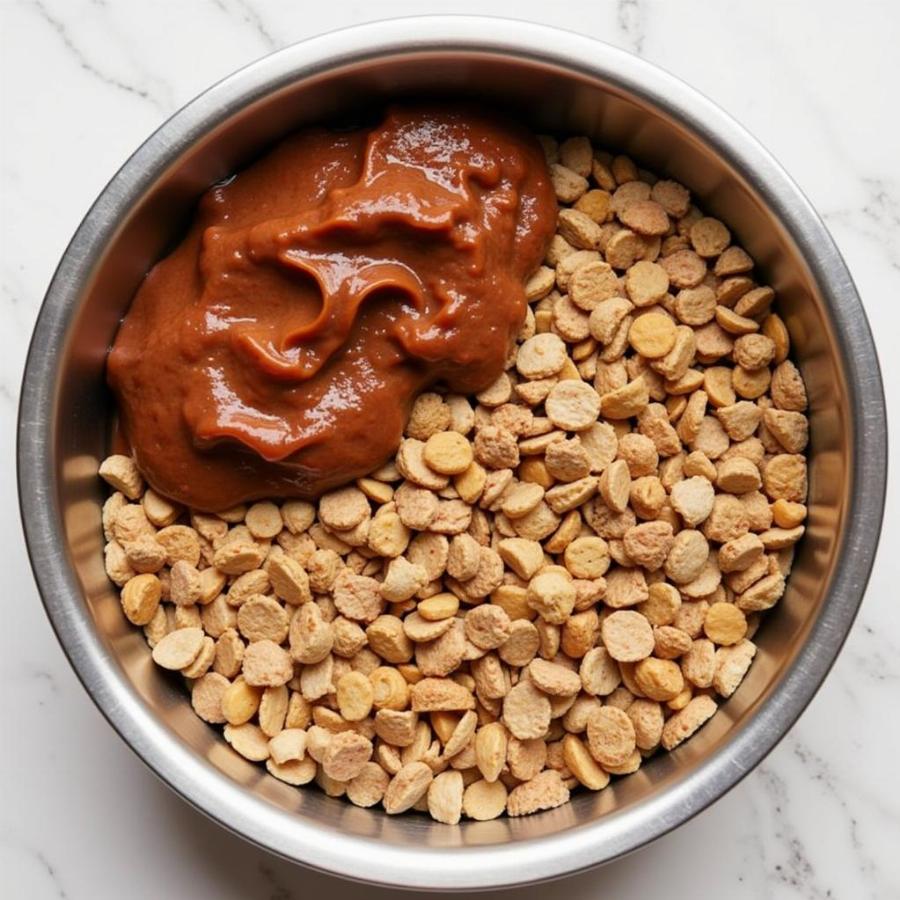Royal Canin Digestive Care wet dog food is a popular choice for pet owners seeking to support their dog’s digestive health. This comprehensive guide explores the benefits, ingredients, feeding guidelines, and frequently asked questions about Royal Canin Digestive Care wet food, helping you make an informed decision for your furry friend.
Choosing the right food for your dog can significantly impact their overall well-being. Digestive issues can be uncomfortable for dogs and lead to various health problems. Royal Canin Digestive Care wet food is specifically formulated to address these concerns, providing a highly digestible and palatable option for dogs with sensitive stomachs.
Understanding Your Dog’s Digestive Needs
Just like humans, dogs can experience a range of digestive issues, from mild upset stomachs to more chronic conditions. Factors like food sensitivities, stress, and underlying medical conditions can all contribute to digestive problems. Signs of digestive issues in dogs can include vomiting, diarrhea, gas, loss of appetite, and weight loss. Recognizing these signs is crucial for addressing the problem promptly. If you notice any of these symptoms, it’s always best to consult your veterinarian. They can help determine the underlying cause and recommend the best course of action, which may include a dietary change like switching to Royal Canin Digestive Care wet food.
Why Choose Royal Canin Digestive Care Wet Food?
Royal Canin Digestive Care wet food is formulated with highly digestible proteins and prebiotics to support optimal digestive function. The wet food format is often more palatable for picky eaters and can be beneficial for dogs who struggle with dry food due to dental issues or other health concerns. The added moisture content in wet food also helps support hydration.
Ingredients and Nutritional Profile of Royal Canin Digestive Care Wet
Royal Canin Digestive Care wet food features a balanced blend of nutrients designed to promote healthy digestion. Key ingredients often include highly digestible proteins like chicken or pork by-products, rice, and prebiotics like fructooligosaccharides (FOS). These prebiotics help nourish the beneficial bacteria in the gut, contributing to a healthy digestive environment. The formula is also low in fat, which can be helpful for dogs with sensitive stomachs. For a detailed breakdown of the ingredients and nutritional analysis, always refer to the product label.
Feeding Guidelines for Royal Canin Digestive Care Wet Food
The recommended feeding amount of Royal Canin Digestive Care wet food varies depending on your dog’s age, weight, and activity level. It’s essential to follow the guidelines provided on the product label and consult your veterinarian for personalized recommendations. Overfeeding can lead to weight gain and exacerbate digestive issues, while underfeeding can result in nutritional deficiencies. It’s also crucial to ensure your dog has access to fresh water at all times.
Transitioning to Royal Canin Digestive Care Wet Food
If you’re switching your dog to Royal Canin Digestive Care wet food from another diet, it’s essential to transition gradually to avoid digestive upset. Start by mixing a small amount of the new food with their current food, gradually increasing the proportion of Royal Canin Digestive Care over several days. This allows your dog’s digestive system to adjust to the new food and minimizes the risk of diarrhea or vomiting.
Combining Wet and Dry Food
Some pet owners choose to combine Royal Canin Digestive Care wet food with dry kibble. This can provide a variety in texture and flavor, making meals more appealing to picky eaters. However, it’s crucial to adjust the feeding amounts of both wet and dry food to avoid overfeeding and maintain a balanced diet.
 Combined Serving of Royal Canin Digestive Care Wet and Dry Food
Combined Serving of Royal Canin Digestive Care Wet and Dry Food
Is Royal Canin Digestive Care Wet Food Right for My Dog?
Royal Canin Digestive Care wet food can be a beneficial option for dogs experiencing various digestive issues. If your dog suffers from frequent diarrhea, vomiting, gas, or loss of appetite, this specialized formula may help improve their digestive health. However, it’s always best to consult your veterinarian before making any dietary changes. They can assess your dog’s specific needs and determine if Royal Canin Digestive Care is the right choice. Similar to choosing the best canned dog food for constipation, it’s important to consult a vet.
“In my experience, Royal Canin Digestive Care wet food has been a valuable tool in managing digestive issues in many of my canine patients,” says Dr. Emily Carter, DVM. “The highly digestible ingredients and prebiotics can make a significant difference in their comfort and overall well-being.”
Conclusion
Royal Canin Digestive Care wet dog food offers a targeted nutritional solution for dogs with digestive sensitivities. Its highly digestible formula, palatability, and added moisture can contribute to improved digestive health and overall well-being. However, consulting your veterinarian is always recommended to ensure this food meets your dog’s specific needs. Royal Canin Digestive Care wet food can be a valuable addition to a comprehensive digestive health plan for your canine companion.
FAQ
- What are the common signs of digestive issues in dogs? Common signs include vomiting, diarrhea, gas, loss of appetite, and weight changes.
- How do I transition my dog to Royal Canin Digestive Care wet food? Gradually mix the new food with their current food over several days.
- Can I mix Royal Canin Digestive Care wet food with dry kibble? Yes, you can combine wet and dry food, but adjust feeding amounts to avoid overfeeding.
- Where can I purchase Royal Canin Digestive Care wet food? It’s available at many pet stores and online retailers.
- Is Royal Canin Digestive Care suitable for all dog breeds? While generally suitable for many breeds, consult your vet for breed-specific recommendations.
- How long does it take to see results with Royal Canin Digestive Care? Improvements can vary, but some pet owners report positive changes within a week or two.
- What should I do if my dog’s digestive issues persist despite using this food? Consult your veterinarian for further evaluation and guidance.
